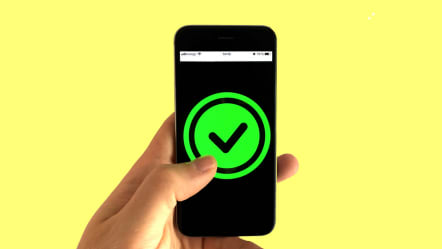10 Interviewing Skills Tech Employers Look For

Making a good impression in an interview can improve your chances of getting the job.
Most individuals think they are aware of what to expect during an interview. They could prepare for questions about their strengths and weaknesses, be conscious of making eye contact, and sit with good posture. Important questions are not the only things that the modern behavioral interview process entails, said Margraber , who is a career success coach at Fullstack Academy and also runs her own recruiting firm, Career Coach Dezzi.
Be sure to have examples and anecdotes ready to go to back up your skills, as interviewers will be looking for this. Additionally, demonstrate that you can think on your feet, and show your interviewer how excited you are about the company to make a great impression. They're also trying to find out what kind of person you are to work with.
10 JOB INTERVIEW SKILLS EMPLOYERS LOOK FOR
- Storytelling
- Preparation
- Taking notes
- Managing your nerves
- Confident approach
- Explanatory Skills
- Clear sense of purpose
- Being able to relate to own skills
- Adaptability
- Curiosity
"Your evaluation score will be impacted as much by how you present yourself during the conversation and the stories you tell as it will by your knowledge and skills," Margraber said. "To be successful in your job search, you need to know how to interview," explained Margraber.
Repeated practice will make you better at interviewing and more confident.
Storytelling
The importance of this rests in what Tyrion Lannister (Game of Thrones) said: "There is nothing more powerful than a good story." Keep in mind that the hiring manager is interviewing a lot of other candidates when you are interviewing. Candidates with the best stories tend to be more memorable. The stories of the marathon runner or the person who worked at 24 Hour Fitness will be brought up in conversation because they were relevant to the interview. Stories are also able to assess your skills. Questions like “Would you say you have a creative mind?” lead you to tell a story, too. The candidates who can tell their stories the best are usually the ones we remember.
The key to success starts with knowing your pitch and practicing it. Not just practicing in front of a mirror or recording, but saying your pitch in front of a family member or friend. This doesn't have to be rehearsed, but making it a habit will help it become second nature. I teach people to use the STAR method [situation, task, action, result] when bullet point their responses in their head in order to effectively tell an illustrative story while staying within the two minute time limit.
Preparation
Being prepared for an interview shows that you are serious about the opportunity and gives you a chance to learn more about the company. It is the responsibility of the recruiter to find candidates that not only can do the job, but will also be a good cultural fit for the company and enjoyable to work with.
When doing your research, please consider the following: the company’s mission statement and philosophy, news from the past six months, and the people you will interview with. In addition, think about what you can bring to the table that would be beneficial for the company.
Taking Notes
Being prepared with pen and paper during an interview demonstrates that you are ready and willing to take the position seriously. When you take notes during our conversation, it shows me that you value my input and are excited about the discussion. This speaks to your level of enthusiasm and ability to pay attention to detail. You can use the same notes to send a thank-you email and promote yourself.
You can keep writing utensils and paper ready and simply ask the interviewer at the start of the interview if it's okay for you to take notes. Also, there are situations when three-pronged questions are asked. Use the pen and paper to note done the question so you don't forget what was asked.
Managing your nerves
The ability to manage your nerves is important for some roles, such as C-level roles that require talking to stakeholders. It is normal to feel some nerves when applying to be a software engineer, but if you are feeling nervous throughout the entire interview process, this may be cause for concern. It is not an impediment to progress, but it does give an indication of your flexibility and ability to adapt. If, after ten minutes, you have not acclimatized and are still shaking, I may begin to wonder what other aspects of real life will prove similarly challenging for you. Still, it’s just one factor we consider out of many. Nervousness can be good for you. Margraber suggests thinking of yourself as someone else if you get too overwhelmed. You could imagine being James Earl Jones, an actor with a great voice that is known for speaking in a cool, calm fashion. When you're nervous, your voice can become shaky and you'll start talking very fast. So, imagining being that cool, chilled actor can help slow you down. Also, gripping your pen tightly is a good way to release nervous energy.
Confident approach
Being prepared for questions and challenges is key during job interviews. If they ask you in a data science interview which model you’d use to solve a data problem, they’re going to ask you, "Why?" They might already have an answer in their head. It is essential that you evaluate the positive and negative aspects of your plan so that you can argue against that proposal and convince others to adopt your point of view.
During an interview, it is essential to come across as confident and passionate about your work. If you have not had much experience with interviews, ask a relative or friend to help you practice beforehand. By considering the pros and cons of your previous work, you can bolster your explanation to interviewers.
Explanatory Skills
A lot of people want to become data scientists or analysts, but they can't effectively communicate their process once they leave school. It is your responsibility to communicate your models or decisions to others who may not be experts in the field. If you are not able to explain your work process in an interview, then how will you be able to execute it properly at work? You need to be able to articulate your work to everyone, not just those with prior knowledge.
Your model's functionality does not need to be transparent to every individual, however you should be able to explain its purpose.
Help those who are not in your industry to understand what you are discussing. They might not understand all the terminology, but the general sense might be clear to them and they might be interested. I also like teaching kids about machine learning. I am forced to explain the concepts in a language they understand. This is also true if you want to talk to a chief product officer during an interview. You don't need to tell them every little detail, but you should be able to explain how it works.
Clear Sense of Purpose
You must be able to explain during an interview why you want to work for this specific company and what about the role interests you. If the interviewer does not connect with your reasoning, being technically skilled will not make a difference.
Be prepared to discuss your motivations for seeking new opportunities during interviews. If you're hoping to join this team, it's important that you understand where you would fit in. Try to customize your story to the role of the person you're talking to. You can gain valuable insights by speaking with people in your network who hold the positions you are interested in, learning about their work and how they communicate with others.
Being able to relate to own skills
Job postings often contain information about what qualities the employer is looking for in candidates. If more people used this information to prepare for interviews, they would be more successful. When interviewers inquire about specific items on a resume, some applicants are not prepared to answer such questions in detail as they had not expected to be asked about them. You must be prepared to talk about every detail in the job posting.
Make a list of your accomplishments that match the qualifications required for the job you’re applying for. It is important to differentiate your skills from others in the field. Another useful exercise is to list 10 things that make you different from other candidates. Ask your friends and colleagues for help brainstorming examples. This can be tough for people to do, and that's why I enjoy practicing it.
Adaptability
Being flexible and able to pivot is key during periods of change and uncertainty - employers are looking for this! Make sure you know who you'll be meeting with. Often, there is more than one person.
Employers want you to be able to change with the times.
This is your chance to shine and prove to the company that you're the right candidate for the job, so make sure you're prepared! You can be prepared for anything by practicing your answers to tough questions. If you're not comfortable talking about your employment gap or degree, you're not going to get the job.
Curiosity
Don't let your nerves get the best of you during your next interview by preparing ahead of time. Instead of feeling like an interview, let's turn this into a conversation so we can get to know each other better. I find that it tends to relax you and the interviewer, making it easier for them to get to know you and assess your potential as a candidate.
You'll be surprised how much people love talking about themselves - ask them about their weekend plans or how long they've been with the organization. Being yourself is the best way to get the job. When they ask about leadership style, ask how it would fit into the company. That's the kind of questions that get them engaged and you don't have to talk all the time.


















